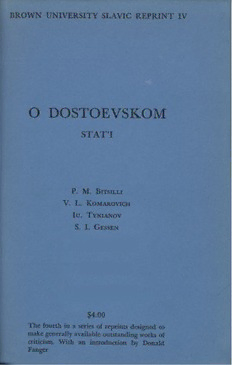
O Dostoevskom. Stati (О Достоевском. Статьи) PDF
Preview O Dostoevskom. Stati (О Достоевском. Статьи)
BROWN UNIVERSITY SLAVIC REPRINT IV O DOSTOEVSKOM STAT’I P. M. BlTSILLI V. L. Komarovich lu. Tynianov S. I. Gessen Introduction by Donald Fanger / « Providence, Rhode Island Brown University Press 1966 Copyright © 1966 by Brown University All rights reserved Library of Congress Catalog Card Number: 66-23779 CONTENTS INTRODUCTION ѴІІ BIBLIOGRAPHICAL NOTE ІХ K VOPROSU O VNUTRENNEI FORME ROMANA dostoevskogo P. M. Bitsilli 1 iunost’ dostoevskogo V. L. Komarovich 73 “mirovaia garmoniia” dostoevskogo V. L. Komarovich 117 DOSTOEVSKII I GOGOL’: K TEORRI PARODII Iu. Tynianov 151 TRAGEDIA DOBRA V “bRAT’IAKH KARAMAZOVYKH” dostoevskogo S. I. Gessen 197 INTRODUCTION This volume represents a new departure for the Brown University Slavic Reprint Series, whose purpose remains to make generally available, again or for the first time, some of the best works of Russian criticism—works that too often are to be found only in a handful of large libraries. Until now, this rescue operation has been confined to critical monographs; but the gratifying spread of such reprinting projects, here and in Europe, seems by now to promise that the great majority of the most valuable books will gradually be restored to currency. This heartening development, however, has so far left one great field untouched. For if few libraries outside Russia can be expected to contain all of the best books on a given writer, how much truer this must be of uncollected critical articles. The library that has Russkaia Mysl’ may not have Byloe; the library that has Sovremen- nyia Zapiski may not have the Godishnik of Sofia University, or the short-lived A tenei. And yet the student of any single writer or prob lem is likely to find that he needs all of these or some similar spec trum of sources very difficult of access. It is to supply this need that the Slavic Reprint Series turns with this issue to the reprinting of shorter works—essays and articles—on a series of important writers and themes. The rationale for such a turn —service to students and scholars of Russian literature—explains why these collections may, on occasion, differ in composition from comparable anthologies in English. Our chief criteria are excellence and rarity; stringently applied, they tend to produce miscellanies in the strictest sense. Articles, however excellent, will be ineligible for inclusion if they are available in print elsewhere; topics, however important, will go unrepresented if only work of less than the highest quality is available to represent them—or if work of a higher quality on some other topic is available to take precedence. In the case at hand five studies illuminate five important aspects of Dostoevsky’s work. The longest of them and the most general is Bitsilli’s brilliant attempt to characterize what he calls the “inner form’’ of Dostoev sky’s novels, to define, via the indices of language and structure, the essential nature of the Dostoevskian novel. The approach, though more disciplined, is not unlike Leontiev’s to Tolstoy; and a similar sensitivity to fictional art combines with deep erudition to produce- in the discussions of Dostoevsky’s lexicon, characterization, dramat- icism, grotesquerie—a view that adjusts and synthesizes a number of hitherto partial insights with striking originality. Introduction Vlll Komarovich’s two pieces, by contrast, straddle biography and creative work by treating the vexed problem of Dostoevsky’s early enthusiasm for utopian socialism and its continuing reflection in his work, long after the experience of Siberia had led him to re nounce most of its basic assumptions. The first essay is unexcelled in its re-creation of the atmosphere of the 1840’s in Russian utopian circles; it shows concretely the nature of a faith only feebly suggested by the usual summary phrases, and it throws a good deal of light in passing on the question of Dostoevsky’s relations with Belinsky. “Dostoevsky’s ‘Universal Harmony’ ’’ follows the fate of these ideas as they are treated in the later works and contains, among much else of value, perhaps the best discussion in Russian of the polemic relation of Notes from Underground to Chernyshevsky’s novel What Is To Be Done? Tynianov’s classic study pursues a more strictly literary aim. In vestigating Dostoevsky’s early use of Gogolian techniques, he comes up not only with a definitive statement of the younger writer’s relation to the then dominant influence in Russian literature but a suggestive theory of parody as well, whose possible applications to other such cases still remain to be explored. Finally, Gessen's article on The Brothers Karamazov represents a metaphysical ap proach that has come to seem out of date and—in view of its fre quent abuse—rightly suspect. There would seem, nevertheless, to be no possibility of interpreting any of the major works without con fronting the philosophic questions with which they deal, and Ges sen's meticulous analysis does this squarely and with rare success. From these brief remarks it will be clear that, though the shape of this collection has been dictated in part by factors that precede editorial judgment, it is in at least equal part the product of an editorial judgment that is, of necessity, highly personal and so eminently disputable. Without seeking to minimize my responsibility in this regard, I have sought to make its exercise as enlightened as possible by consulting numerous colleagues in this country and in England, and their generous advice is here gratefully acknowledged. Donald Fanger Stanford University BIBLIOGRAPHICAL NOTE The essays in this volume have been reproduced from the follow ing sources: Bitsilli, Petr Mikhailovich. “K voprosu o vnutrennei forme romana Dostoevskogo.” Sofia Universitet. Istorikofilologicheski fakultet. Godishnik, XLII (1945/46), 1-71. Komarovich, Vasilii Leonidovich. “Iunost’ Dostoevskogo.” Byloe, XXVIII (1924), 3-43. -------. ” ‘Mirovaia garmoniia’ Dostoevskogo.” Atenei, I—II (1924), 112-42. Tynianov, Iurii Nikolaevich. Dostoevskii i Gogol’: K teorii parodii. (Petrograd) Izd. OPOIAZ, 1921. (Reprinted in his Arkhaisty i nova- tory [Leningrad, 1929]). Gessen, Sergei Iosifovich. “Tragediia dobra v Brat’iakh Karama- zovykh Dostoevskogo.” Sovremennyia zapiski, XXV (1928), 308-38.
